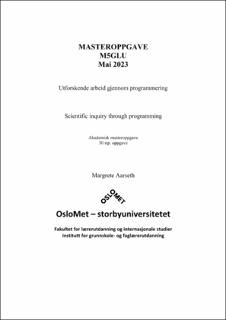| dc.description.abstract | Masteroppgaven er en del av forskningsprosjektet Teachers’ Research Literacy for Science teaching (TRELIS), i samarbeid med OsloMet og HVL. I denne masteroppgaven har jeg gjennomført en enkeltcasestudie på 8.trinn hvor jeg har undersøkt hvordan PRIMM kan være en måte å tilrettelegger for utforsking i naturfag gjennom programmering. PRIMM er et rammeverk intendert som en støtte for lærere i planlegging og gjennomføring av programmeringsbasert undervisning, og står for Predict, Run, Investigate, Modify og Make. For å finne ut om elevene utforsker når de bruker programmering i PRIMM-basert undervisning, har jeg sett på elevenes samtaler. Studien går i dybden på hvordan de snakker sammen og hva de snakker om, og datamaterialet er lydopptak av elever som arbeider sammen to og to, samt elevenes arbeid i programmet Scratch. Hovedfunnene viser at elevene har ulike typer samtaler i de ulike fasene av PRIMM og at det er forskjell mellom de to gruppene som er gjenstand for analyse. Elevene har uproduktive og produktive samtaler, hvor de produktive samtalene synliggjør en kunnskapsbygging hos elevene. Videre kommer det frem at gruppene driver med utforskende arbeid i alle fasene av PRIMM, men at det er forskjeller mellom og innad i gruppene. Ut ifra funnene diskuteres sammenhengen mellom programmering og utforsking av naturfaglige fenomener i lys av progresjon i programmering, modellering og naturfag, samt sammenhengen mellom PRIMM og modellbasert utforsking, og hvordan PRIMM kan være et nyttig verktøy i planlegging av programmeringsbasert og/eller utforskende undervisning. Avslutningsvis peker jeg på praktiske implikasjoner ved bruk av PRIMM som støttestruktur til utforskende arbeid gjennom programmering.
This master thesis is part of the research project Teachers’ Research Literacy for Science teaching (TRELIS), in collaboration with OsloMet and HVL. In this master thesis, I conducted a single case study in 8th grade to investigate how PRIMM can facilitate scientific inquiry through programming. PRIMM is a framework intended to support teachers in planning and implementing programming-based instruction, standing for Predict, Run, Investigate, Modify and Make. To determine if student inquire while using programming in PRIMM-based instruction, I examined student conversations. The study delves into how students communicate with each other and what they talk about, and the data consists of audio recordings of pairs of students working together and their work in the Scratch program. The main findings show that students have different types of conversations in the different phases of PRIMM, and that there are differences between the two groups analyzed. Students have unproductive and productive conversations, where productive conversations demonstrate knowledge building among the students. Furthermore, the groups engage in scientific inquiry in all phases of PRIMM, but there are differences both between and within the groups. Based on the findings, the relationship between programming scientific inquiry of a scientific phenomenon is discussed in the light of progression in programming, modeling and science, as well as the relationship between PRIMM and model-based inquiry, and how PRIMM can be a useful tool in planning programming-based and/or scientific inquiry instruction. Finally, I point out the practical implications for using PRIMM as a support structure for scientific inquiry through programming. | en_US |
